The 20 most influential people in Australian agriculture
These top 20 agribusiness power players have been selected for their influence, for how their actions affect the entire industry, and for their ability to make big decisions.
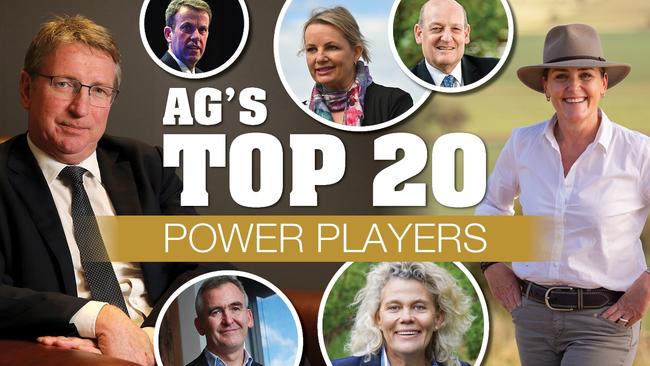
SA News
Don't miss out on the headlines from SA News. Followed categories will be added to My News.
THEY are the people who make ag tick — the movers and shakers of Australian agriculture.
From the absolute peak of world trade power, down to those who keep our farms going day-to-day.
This inaugural list of Australian ag’s top 20 power players reveals an industry that has a strong backbone, yet is at the mercy of global politics and a fragile labour system, laid bare by the Covid crisis.
The power players were chosen by The Weekly Times for their influence on agriculture, for how their actions affect the entire industry, and for their ability to make big decisions.
Agribusiness leaders feature prominently, such is their power over their many customers and suppliers, as do the heads of the big-two supermarkets for the same reason.
There are three federal politicians on the list who are responsible for agriculture, trade and environment.
And the state water ministers make the cut, such is their influence on what is the lifeblood of Australian ag.
Global leaders such as Xi Jinping and Joe Biden make the list not just for their positions as superpower leaders, but for their direct influence on Australian ag.
At present it is Jinping’s influence that holds the most sway, with a clear trade war between Australia and China centred on Australian ag. But Biden’s actions towards China may go a long way to changing the Chinese’ tactics.
Braver people than us may rank them in order; we have gone with an alphabetical listing.
But we would like to know what you think of our list.
HAVE YOUR SAY: Let us know in the comments below of any notable omissions or an argument for why one of our power players is not worthy of such a title.
Alternatively, email online@theweeklytimes.com.au
MARK ALLISON
Elders Limited managing director and Agribusiness Australia chairman
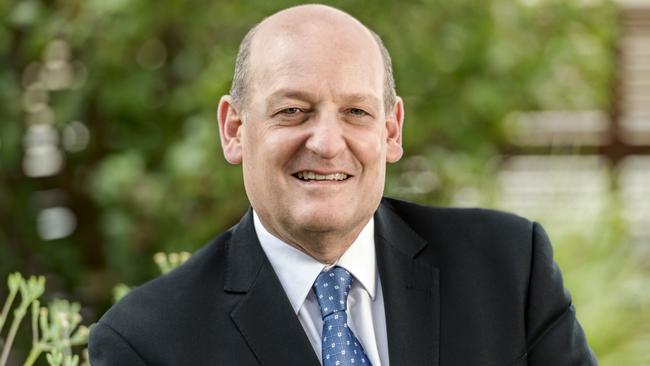
ELDERS managing director Mark Allison dragged one of Australia’s agribusiness icons back from oblivion when he stepped down as chairman to become managing director and chief executive officer in May, 2014.
Shares in the company are now trading at 15-18 times their lowest level, thanks to a series of eight-point plans introduced by Allison.
Elders was one of the few companies which prospered during the COVID-19 pandemic. Its share price is now about 70 per cent higher than it was 12 months ago — a fair indication of its performance.
Allison, a former GrainCorp director, is chairman of AuctionsPlus, sits on a SmartSat Co-operative Research Centre advisory board and Rabobank’s Food and Agriculture Advisory Board and chairs Adelaide University’s Agrifood and Wine Advisory Board.
But one of his most influential roles is as president of Agribusiness Australia.
During the COVID-19 pandemic, he worked with industry leaders to have the Federal Government declare the agriculture sector an essential industry, thereby avoiding the harsh restrictions imposed on other sectors.
He believes some of the challenges for the sector in 2021 will be to encourage exporters to look beyond China for markets if geopolitical challenges persist; ensuring Australian agricultural innovation continues through research and development corporations to boost farm and agribusiness productivity; and ensuring agriculture meets the Australian community’s environmental and sustainability expectations while continuing to increase productivity and being profitable.
MORE
AGRIBUSINESS AUSTRALIA NEW $300B TARGET IN AG PRODUCTION
THE BACKPACKER
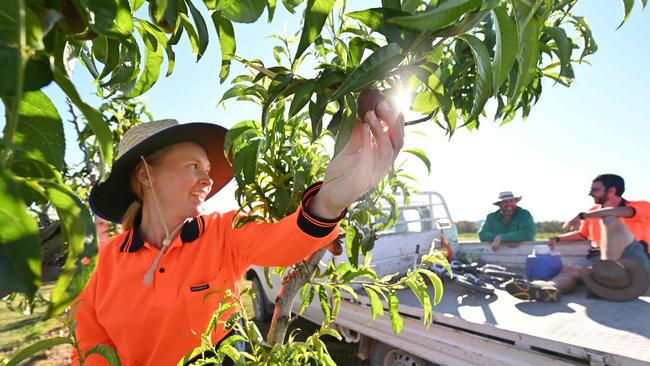
NEVER has the influence of the humble backpacker been more obvious than in the past 12 months.
Thousands of Australian farms have found they cannot operate without these young, able bodies who are willing to travel to far flung farming regions for a few weeks’ work to earn a 12-month visa extension.
Their numbers began to fall in March last year when the first wave of COVID-19 hit and have continued to free-fall ever since to an lowest of 53,712 in December, compared to about 145,000 ordinarily in the country at that time of year.
And their presence has been keenly missed, given their exodus has been coupled with that of thousands of Pacific Islanders here on seasonal worker program visas who also returned home to their families.
Horticulture farmers in particular rely heavily on foreign workers to pick their crops and Australians have largely failed to heed state and federal government calls to “wonder out yonder” – as the WA Government so merrily described the often backbreaking work – to head inland and pick farmers’ laden crops following a year of good seasonal conditions.
A register set up late last year to record the financial extent of crop losses due to the worker shortage already tallies $40 million and is expected to increase.
With a vaccine unlikely to roll out across Australia until March, the return of the overseas farm worker looks set to remain just as elusive.
MORE
EXPLAINER: WHERE TO FOR AGRICULTURE’S WORKER SHORTAGE?
JOE BIDEN
US President
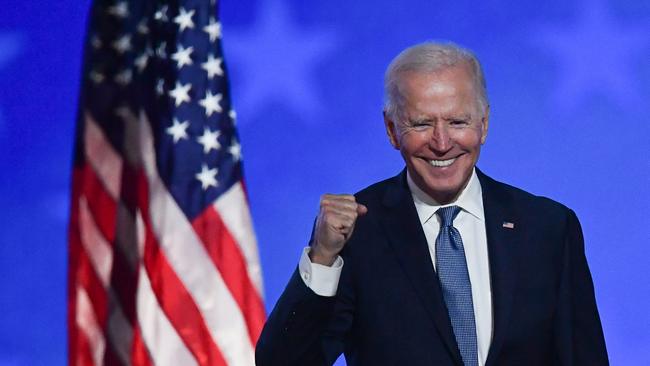
WITH Joe Biden inaugurated as the 46th President of the US last week, the agricultural world now waits with bated breath to see what trade policy directions will be put in place after four years of chaos under his predecessor Donald Trump.
Both former and current Presidents have singled out China as a regional trade pariah.
But a hint at what Australia can expect from President Biden came as late as last week when Treasury Secretary Janet Yellen railed against China’s “abusive, unfair and illegal practices” which included artificially keeping the yuan lower to make its exports more attractive.
Yellen says it is important for the Biden Administration “to work with our allies” in countering China’s influence.
The Australian Government will be hoping it is one of those allies.
The “allies” may not include the European Union, which recently struck an investment agreement with China despite calls from the Biden camp to wait until after the new US administration was installed.
Australia, Britain, Japan, Canada and ASEAN nations are the most likely candidates for an alliance against China.
Through Yellen, President Biden is signalling he wants to be one of the global influencers in agriculture in 2021.
MORE
EX-DAIRY LOBBY BOSS NEW US AGRICULTURE SECRETARY
MIKE CARROLL
Agribusiness elder and board director
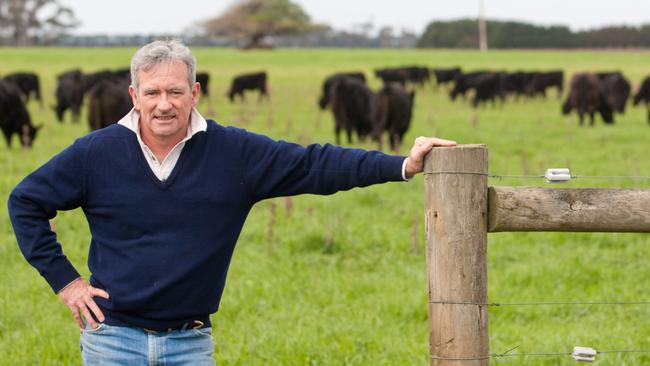
MIKE Carroll has a breadth of knowledge in corporate agriculture, having headed National Australia Bank’s agribusiness division for six years and serving on a number of company boards.
But he is also well grounded: at the other end of the spectrum, he runs his own beef farm, Widgeegonga Angus, at Derrinallum in Western Victoria, selling cattle into the feedlot sector.
Carroll currently sits on the board of ASX-listed companies Select Harvests and Rural Funds Management, plus Macquarie Group subsidiaries Paraway Pastoral Company and Viridis Ag.
In the past, he has been a director of Elders, Warrnambool Cheese and Butter, salmon producer Tassal and sugar marketer Queensland Sugar.
He has also served on the boards of Rural Finance Corporation and Meat and Livestock Australia and currently chairs the Australian Rural Leadership Foundation.
Carroll sees the No. 1 challenge for agriculture as addressing the China conundrum.
He believes Australia needs to stand by its own values and principles to stare down China, even though it may hurt the agriculture sector.
He says the best tactic is to ignore China and look for alternative markets.
Carroll sees the other challenges as restoration of international faith in free trade and Australia capitalising on the “purple patch” its commodities are currently traversing.
He says the agriculture sector needs to maximise its opportunities during the current boom to set itself up for the inevitable downturn in the cycle.
MORE
MIKE CARROLL EQUALLY AT HOME ON FARM AND IN BOARDROOM
MARC DROUIN
Senior managing director, Public Sector Pension Fund
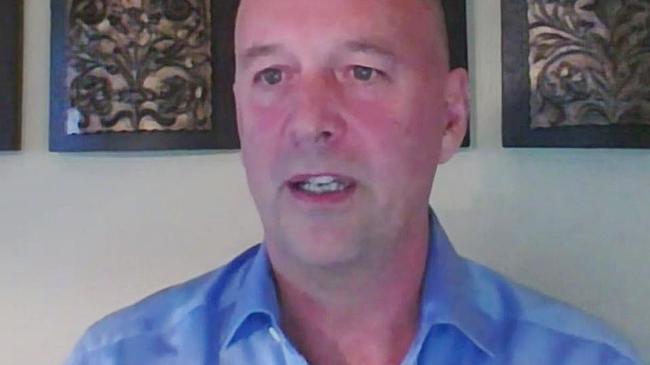
THERE’S few people who have a greater potential to influence Australian agriculture’s landscape than Canadian Mark Drouin.
Drouin is the senior managing director and global head of natural resources with PSP Investments – which manages the superannuation funds of Canada’s public service, armed forces and the 30,000 member-strong Royal Canadian Mounted Police and has bolted into top spot as Australia’s biggest land and water holder in recent years with assets valued well in excess of $3 billion.
In 2020, PSP signed off on one of Australia’s biggest-ever agricultural deals – the $854 million takeover of the ASX-listed Webster Limited, one of Australia’s oldest companies and one of the nation’s biggest landholders. Through its Aurora Dairies business it also paid $55 million for an aggregation of dairy farms around Nambrok, in Gippsland, formerly owned by Gray Wigg Pty Ltd, and $40.4 million for farms near Mt Gambier in South Australia from the ASX-listed Beston Global Food Company.
What Drouin, the former business development boss of global mining company Anglo American, has up his sleeve for 2021 remains to be seen.
MORE
WHO OWNS AUSTRALIA’S FOOD AND FIBRE CHAIN
BRENT EASTWOOD
JBS Australia president and chief executive
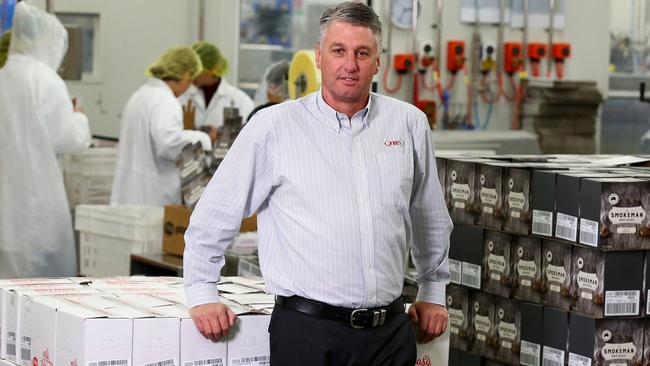
MARKETS move money and what a consumer in far flung parts of the globe might wish to serve up to their family for dinner tonight can greatly influence prices paid at the Australian farm gate tomorrow.
Few know this better than Brent Eastwood, chief executive officer and president of JBS Australia – the nation’s biggest meat processing company which exports product to more than 80 countries.
An offshoot of the Brazil-based JBS – which has evolved over the past 50 years from a humble slaughtering business into the world’s No. 1 meat processing company with more than 150 processing facilities globally – JBS Australia operates 10 abattoirs and five feedlots locally, spread from Tasmania in the south to Townsville, Queensland, in the north.
It has the capacity to process more than 8000 cattle and 21,000 small stock, including sheep, a day and employs a whopping 12,000 staff across Australia.
In other words, it’s a powerhouse with the ability to flick a switch and make for a good or tough day for producers at the saleyards. And, with processors being squeezed by current record beef and lamb prices, the likes of New Zealand-born Eastwood will have plenty on their plate this year.
MORE
ROGER FLETCHER
Director, Fletcher International Exports
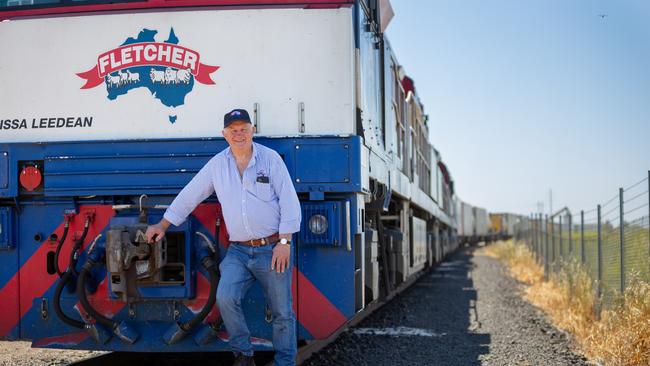
FEW, if any, would loom larger over a single ag commodity than Roger Fletcher.
The Dubbo lamb processor and his army of buyers are the dominant force in Australia’s sheep meat sector, buying millions of sheep each year to feed Fletcher International Exports’ plants in NSW and Western Australia.
But the modest self-made Fletcher is much more than a lamb trader, processor and exporter. He is now a significant grain exporter and one of Australia’s biggest landowners.
Until recently he owned 20 per cent of Cubbie Station, Australia’s biggest cotton and most controversial farm.
While down to earth, Fletcher is not one to shy away from making his voice heard, particularly over issues that affect his export operations.
“I do my share (of calling to Canberra),” he told AgJournal last November, “but only when there is a problem and I have a solution.”
And as for Fletcher’s worth, as a private family company, that would be anyone’s guess. But rest assured the monetary value would more likely start with a “b” than an “m”.
MORE
HOW ROGER FLETCHER WENT FROM RAGS TO RICHES
ROGER FLETCHER CALLS FOR SHEEP, WOOL COUNCIL UNITY
BARRY IRVIN
Bega Cheese executive chairman

BARRY Irvin enters his 21st year as chairman of Bega Cheese Limited in 2021.
Irvin has steered the company from a small dairy processor in the town of Bega in southern NSW into the third largest dairy operation in Australia.
As executive chairman, Irvin is integral to the performance of the company.
He is a strategist and works hard to ensure Bega is successful, regularly dealing with bankers, brokers and key institutional financiers.
One of the keys to Bega’s success has been a move to focus more on branded rather than commodity products.
The biggest coup was buying the iconic Australian breakfast spread Vegemite from US food and beverage company Mondelez International for $460 million in January, 2017.
Then late last year Bega bought Lion Dairy & Drinks for $534 million, which included an array of dairy and juice brands, such as Pura, Dare, Yoplait, Berri and Daily Juice Co.
The deals brought forward its 2023 brand targets by at least two years.
For both acquisitions, Bega was able to follow it up with big capital raisings to help pay for the new brands — a mark of confidence in the strategy by investors, particularly institutional investors.
Prior to the Vegemite deal, Bega’s revenue was about $1.2 billion and its net assets were about $328 million.
The revenue is expected to be about $3 billion this year and its net assets about $1.2 billion.
It is now a serious food and beverage player and, accordingly, makes Irvin very influential in the industry.
Like Mark Allison, Irvin also sits on Rabobank’s Food and Agriculture Advisory Board.
The challenge for Irvin is to keep building the business.
MORE
MEET BARRY IRVIN, AUSTRALIA'S ULTIMATE MILK MAN
XI JINPING
Chinese President
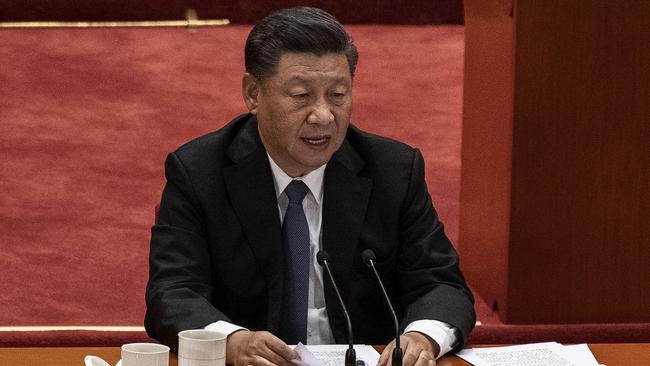
WHEN times are good, China’s the best customer Australian agriculture can ask for, to the tune of $14 billion in export trade.
But last year exposed how delicate the relationship with our biggest trading partner really is, and how much our exports are at the whim of President Xi Jinping and his government.
China has consistently not played by international trade rules since it joined the World Trade Organisation in December, 2011, and Australian agriculture has borne the brunt of unfair Chinese trade tactics since it raised the need for a proper investigation into coronavirus in China.
When Australia called for that investigation, China retaliated by banning several abattoirs from exporting and slapped the barley trade with crippling tariffs of more than 80 per cent.
As diplomatic ties between the two nation’s worsened, China retaliated by hitting us where it hurts, with agriculture copping the brunt of its ire: rock lobster, wine, cotton, timber have all been targeted so far, and have been forced to cop either a financial hit or scramble to find new markets.
With China still rejecting pleas from our politicians to “pick up the phone” and talk it out, this situation has the potential to get a whole lot worse for ag in 2021.
MICK KEOGH
Deputy chair, Australian Competition & Consumer Commission
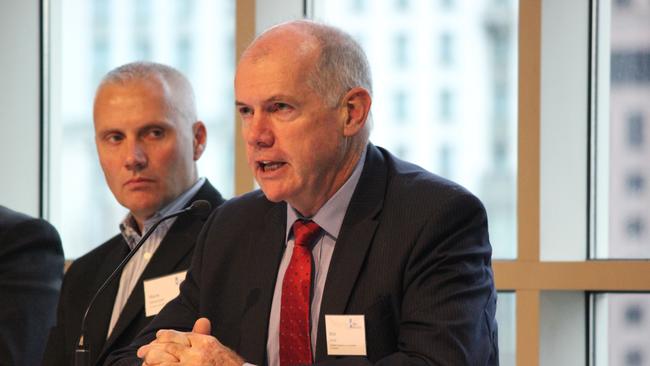
IF YOU’RE a farmer in Australia, chances are the work of Mick Keogh has an impact on how you do things, in ways you may not even realise.
With a lifetime of experience in advocacy and advisory roles, the former Australian Farm Institute executive director is one of the most respected names in agricultural policy, diligently working away on the issues that affect farmers’ day to day.
Keogh was appointed head of the Australian Competition and Consumer Commission’s new agriculture unit in 2016, undertaking key work examining the meat supply chain, wine grapes and dairy industry.
The ACCC’s dairy code of conduct has become a critical flashpoint for that industry, while enforcing mandatory rollover protection for quad bikes will be another key fight in 2021.
SUSSAN LEY
Federal Environment Minister
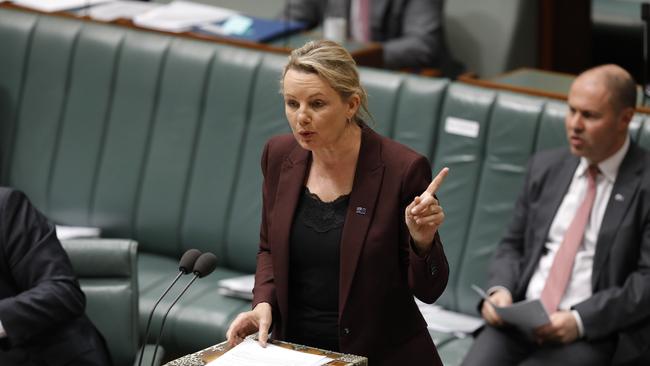
THERE’S no denying the political power Sussan Ley holds. It’s rare – perhaps unprecedented – for a federal Environment Minister to hail from a rural electorate so dependent on one of the nation’s most contentious natural resources: water.
Ley has represented the division of Farrer, which abuts the Murray River west from Albury to the NSW-South Australian border and runs north through the key irrigation districts of Deniliquin, Griffith and Hay, since 2001.
While she has held numerous portfolios in cabinet – including health, sport, aged care and education – it was Ley’s appointment as Environment Minister in 2019 that put her on somewhat of a collision course with the bulk of her constituents: farmers that want to see less water allocated to the environment and more diverted toward irrigating their crops, sustaining their local communities and feeding the world.
With the environmental lobby in clear disagreement, Ley has been forced to walk a fine line. She stared down angry farmer calls for the Government to scrap its controversial Murray Darling Basin Plan, which she admits is “not perfect” and needs to be adaptive but is “better than no plan at all”.
Meanwhile, she’s now in charge of steering through reforms to the Environment Protection and Biosdiversity Act, which could influence how farmers use their land in the future.
Whether her calls from the country can influence significant change in the corridors of power in Canberra remains to be seen.
DAVID LITTLEPROUD
Federal Agriculture Minister

WHEN Littleproud was first promoted to Cabinet in 2017, most people had one question: “Who?”
Since then, he’s developed a reputation as one of the Nationals’ best political performers and, after being elected the party’s deputy in 2020, it’s likely just a waiting game until the Queensland MP and former rural banker becomes its leader.
Littleproud was welcomed by the ag sector as having a calmer, more methodical approach to the portfolio than his predecessor and impressed in his early days, such as his initial response to the live sheep export disaster.
He’s known for advocating a hands-off approach: get the settings right, and let the farmers get on with it.
It’s one most of industry seems to appreciate, as long as it’s not an excuse for inaction – and so far, there’s been more sound bites than lasting change that will actually get the industry on its path toward $100 billion.
As Agriculture and Drought Minister, he’s in the box seat to make that goal happen, but this year he’ll need to use his influence to step up and really lead on key issues for the sector: workforce shortages, biosecurity, and more trade pathways to start.
MURRAY DARLING BASIN STATE AND TERRITORY WATER MINISTERS
Lisa Neville (Vic), Melinda Pavey (NSW), David Spiers (SA), Glenn Butcher (Queensland), Shane Rattenbury (ACT)
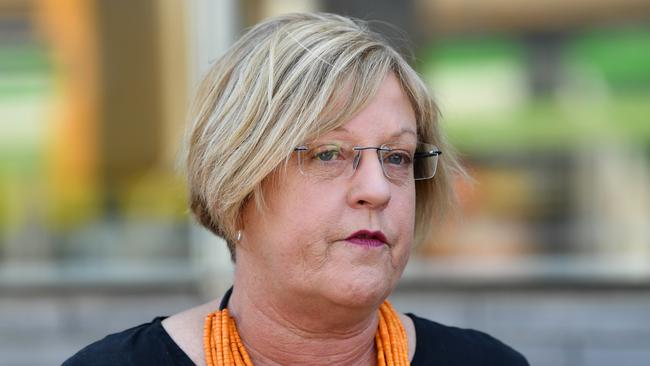
TRUTH be told, there are countless factors influencing how one of agriculture’s most vital resources – the 530,000 gigalitres of inflows in the Murray Darling Basin – is used.
From the irrigators of water-intensive crops and water brokers playing in the water market, to environmentalists seeking more water for wetlands and wildlife, the power plays and debates are ceaseless.
The Murray Darling Basin Authority cops a lot of the heat for its implementation of the Murray Darling Basin Plan, but it’s just the messenger – the reality is, the Murray Darling Basin state water ministers have the real influence.
On an individual level, their state water trading rules and resource plans dictate the shape of the basin; and when they come together as the ministerial council, it’s their decisions that determine the future of the basin plan.
Even Federal Water Minister Keith Pitt and the basin’s interim inspector-general Troy Grant are limited in how much they achieve without the states on side, given ultimate responsibility for water lies with the states.
Farmers are still waiting to see how the ministerial council will resolve key issues, such as the recovery of an extra 450GL from Victoria and NSW.
LIZ O’LEARY
Head of agriculture, Macquarie Group
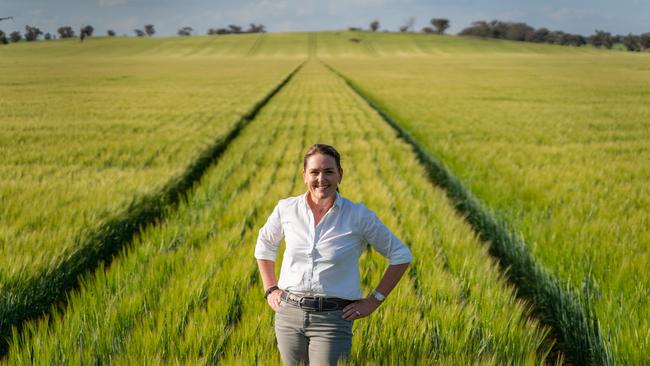
LIZ O’Leary is Australia’s biggest grain farmer. She is also one of the top four beef producers in the nation.
That she does so from a Sydney office does not diminish her standing. In fact, it enhances her role as the face of the increasing corporatisation of Australian broadacre farming.
As head of Macquarie Bank’s agricultural investment arm, O’Leary controls 50 cropping and livestock farms worth $2.7 billion across 4.7 million hectares.
The beef operation – valued at $1.3 billion – ranges from vast cattle stations in the north to highly specialised properties in the south.
More than 30 million kilograms of beef is produced each year, while a 320,000-head sheep flock yields more than 1.5 million kilograms of fine wool annually and 170,000 prime lambs.
In addition, Macquarie now owns 49 per cent of Australia’s biggest cotton farm – and water user – Cubbie Station, in southern Queensland.
These investments have made a name for O’Leary as an astute watcher of agriculture, quick to pick trends and act on them – even if it draws fire from some quarters as in the case of Cubbie.
Macquarie is now Australia’s biggest single ag investor, and the biggest operating in Australia by value, after Canadian behemoth PSP.
Yet despite the mind-boggling numbers, O’Leary, who grew up on a rice, wheat and sheep farm at Tocumwal, NSW has a simple farming philosophy: “If you look after the soil, it will look after you.”
MORE
MACQUARIE BANK’S FIELD MARSHAL TAKES CHARGE
WHO OWNS AUSTRALIA’S FARMS 2020 — TOP 20 BY VALUE
FOREIGN INVESTMENT REVIEW BOARD PROCESSING TIMES CRITICISED
FIONA SIMSON
President, National Farmers’ Federation
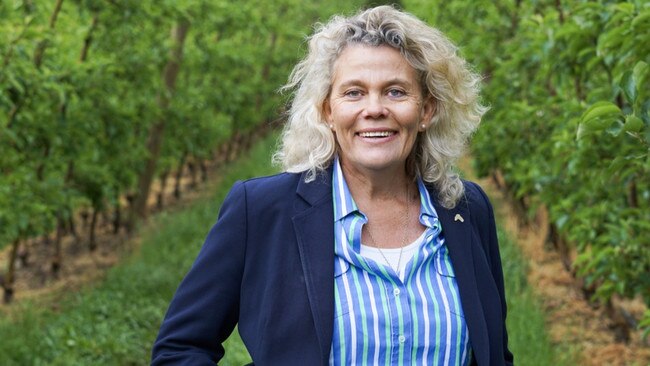
THE National Farmers’ Federation has copped a lot of criticism in the past decade or so: some argue it’s become something of a toothless tiger, others remember the days when the sight of farmers rallying at Parliament House would have politicians quaking in their boots.
That is slowly changing, however, with Fiona Simson at the helm, who’s high media profile and no-nonsense attitude is helping put agriculture back on the front page.
Simson and NFF chief executive Tony Mahar are arguably one of the strongest leadership teams the farm lobby has had in a long time, bringing with it immense opportunity to affect ag’s future.
Her approach is still not all farmers’ cup of tea – advocating working with decision makers behind closed doors over shouting and screaming – but it seems to be working: pretty much all the Federal Government’s major agricultural policies, from reaching $100 billion by 2030 to drought assistance, have come straight from the NFF’s playbook or are being managed by the NFF.
The balancing act for Simson and the NFF is making sure that close working relationship with government is always working in the farmers’ favour, and not the other way around.
JASON STRONG
Managing director, Meat & Livestock Australia
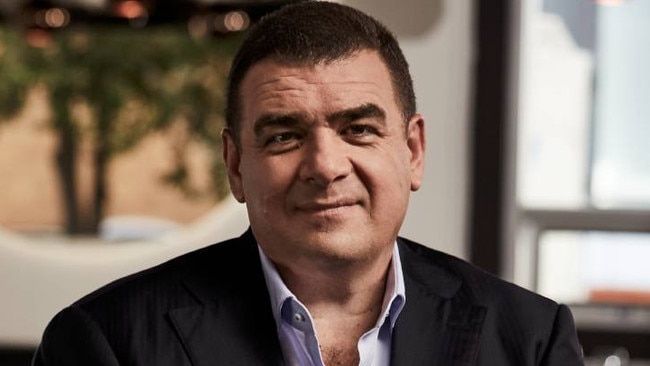
WHEN it comes to influencing what consumers put on their plates, Jason Strong has hit the ground running in 2021.
Meat and Livestock Australia, of which Strong is managing director, released its annual highly anticipated summer lamb campaign earlier this month, poking fun at Australia’s strict COVID-19 border closures.
The advertisement, again featuring former AFL great and lambassador Sam Kekovich, was lauded by industry and the greater public and seeming erased the memories of the 2019 campaign which came under fire for bowing to “the PC police” and pressure over the “Invasion Day” controversy by not being released until after Australia Day.
Strong, a self-confessed “sucker for a well-cooked lamb loin chop”, was appointed MLA boss in April 2019. He was formerly the organisation’s regional manager for Europe and Russia and in the past has served as chief executive of Smithfield Cattle Company and managing director of Australia’s biggest beef herd in AACo.
In an interview when he took on the top job at MLA, Strong said the industry “should not shy away from an ambition like doubling or tripling our supply chain margins”.
But with the new year opening with record returns to beef farmers, further squeezing margins along the supply chain, he certainly has plenty on his plate in the hope to achieve this.
MORE
HOW THE LIVESTOCK INDUSTRY CONTINUES TO SHINE
STEVEN CAIN (COLES CEO) & BRAD BANDUCCI (WOOLWORTHS CEO)
Supermarket bosses
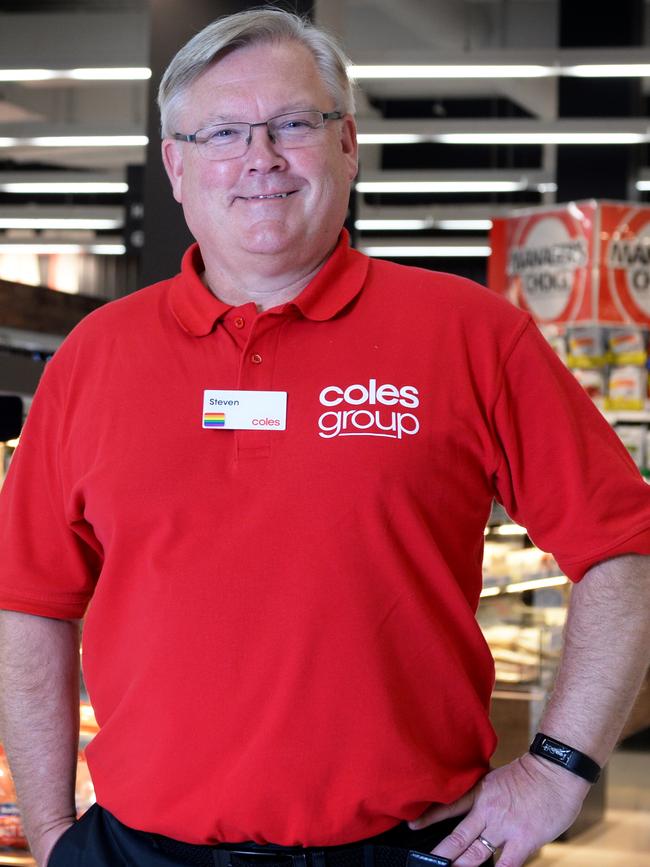
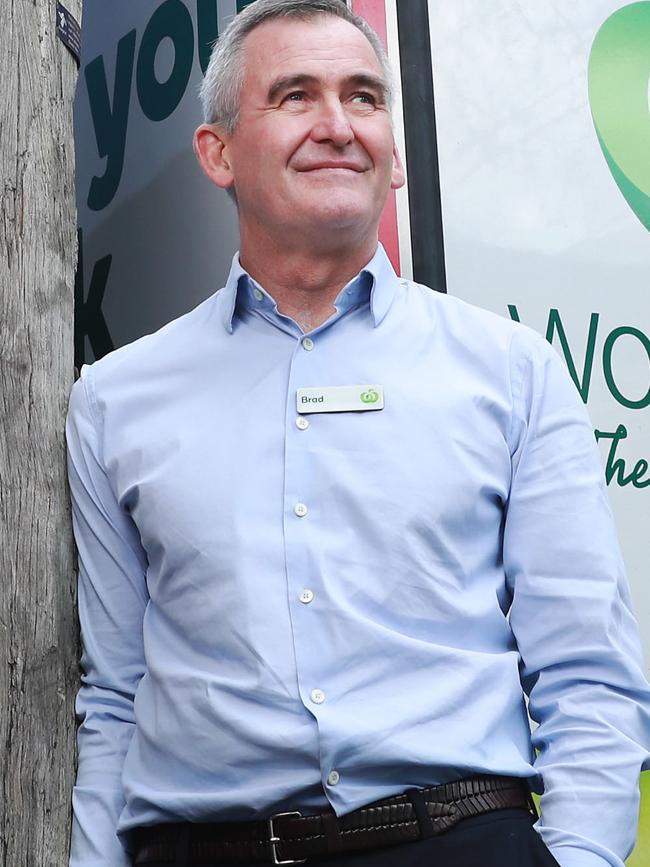
THE extraordinary power wielded by Coles and Woolworths bosses Steven Cain and Brad Banducci is almost unrivalled across Australian agriculture.
Given the supermarket chief executives reign supreme over almost 2000 stores stocking meat, fresh fruit and vegetables, grain products and the nation’s biggest liquor stores, 2021 is tipped to mirror every other year where their clout will continue.
All eyes will be on the movement of fresh fruit and vegetable prices, which have been tipped to rise as much as 60 per cent as a forecast worker shortage of about 26,000 plays out around March when multiple crops simultaneously require thousands of pickers and packers.
The question is whether the supermarkets will absorb some of the price hikes or force farmers to wear the costs.
A three-month ACCC investigation in the dying months of last year into the power imbalance between farmers, food processors and supermarkets found new fair trading laws were needed to protect suppliers.
This year will see the Federal Government progress a number of initiatives that support the competition watchdog’s findings and recommendations, including to strengthen unfair contract term protections under the Australian Consumer Law, enhancing the Food and Grocery Code of Conduct and improving price transparency for the dairy industry under the Dairy Code.
DAN TEHAN
Federal Trade Minister
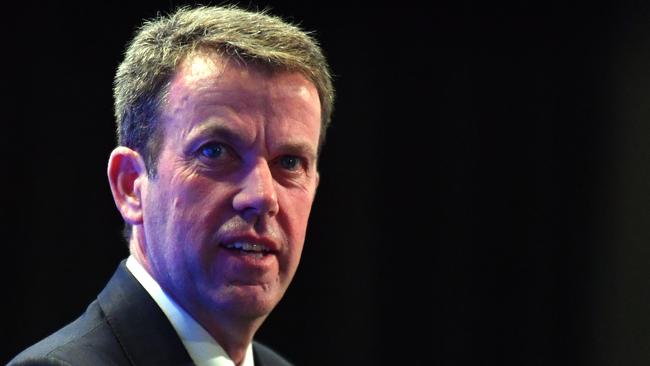
NO ONE would envy the China mess Dan Tehan has inherited – but few would be better prepared to tackle it than him.
In a sense he has been working toward this role for his entire career, having started in the Department of Foreign Affairs in the 1990s, then as a diplomat, then adviser to former trade Minister Mark Vaile.
It’s also the first time the trade portfolio has been in the hands of a rural MP since Warren Truss in 2007: Tehan grew up near Mansfield, his grandfather was one of the founders of the National Farmers’ Federation, and his own electorate of Wannon in western Victoria relies heavily on agriculture exports.
In short, it’s an ideal CV for farmers in need of a trade Minister with trade nous and rural understanding, if he’s to help the industry’s $49 billion in ag exports grow.
Tehan walks into a firestorm of challenges for 2021: China’s ongoing trade blows will be top of the list, as well as negotiating deals with Europe and the UK, and finding new markets such as India.
DAVID WILLIAMS
Kidder Williams principal
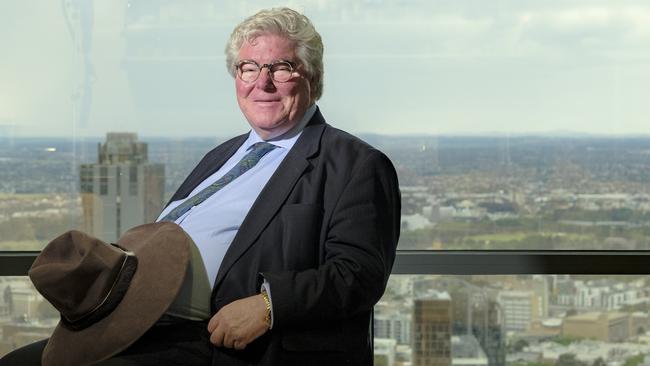
DAVID Williams is the backroom boy behind some of the biggest plays in corporate agriculture and aquaculture – and he loves doing a deal.
He is one of the “covert” influencers in agribusiness — in more ways than just facilitating deals.
At the Global Food Forum last year, he summed up the forum’s proceedings by saying he didn’t hear speakers talk about other important issues, such as waste and stomach health.
Williams later heard from one large agribusiness that its board raised all the issues he singled out.
Kidder Williams’ agribusiness clients include Bega Cheese, Select Harvests, Maggie Beer, the Costa Group and Premier Fruits Group.
In the past, Williams put together the merger of fertiliser companies Incitec and the Phosphate Co-operative Company to form listed agribusiness Incitec Pivot and resurrected the ailing salmon producer Tassal.
He advised Bega Cheese on the Vegemite and peanut butter deal and the purchase of Lion Dairy & Drinks from Kirin.
Williams believes there are many food and beverage businesses on the market and it is possible to build an Australian food conglomerate capable of matching it with the best in the world.
He says international trade is the big issue to resolve in 2021, particularly getting agricultural and food products into China.
Exporters may be able to get around the trade barriers imposed by the Chinese Government through building relationships with traders in other Asian countries, such as Vietnam and Indonesia.
But they also need to look at those other Asian nations as alternative markets for their produce.
Williams has also been an advocate of speeding up the review process for foreign investment in Australian agriculture.
— with PETER HEMPHILL, JAMES WAGSTAFF, ALEXANDRA LASKIE and ED GANNON
Originally published as The 20 most influential people in Australian agriculture


